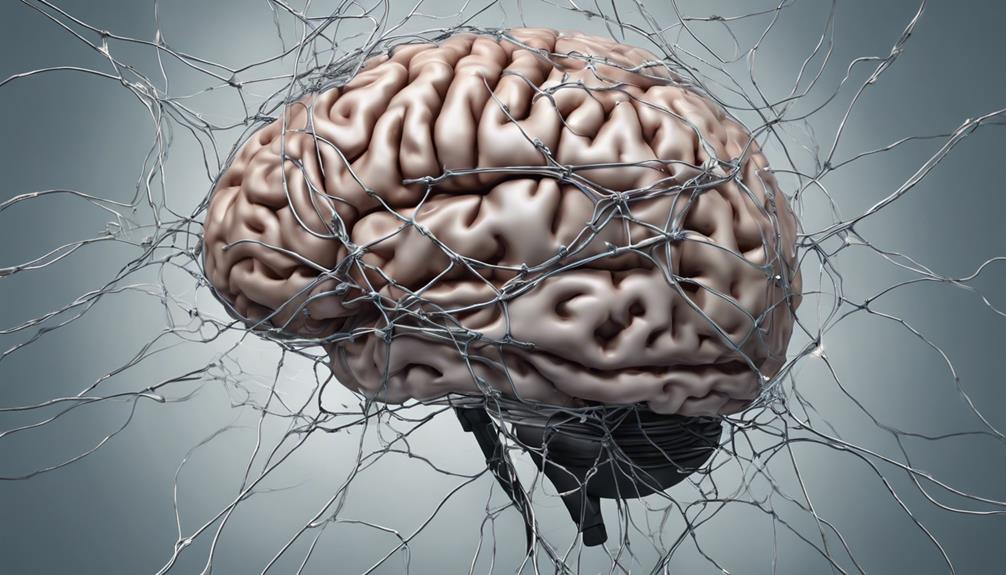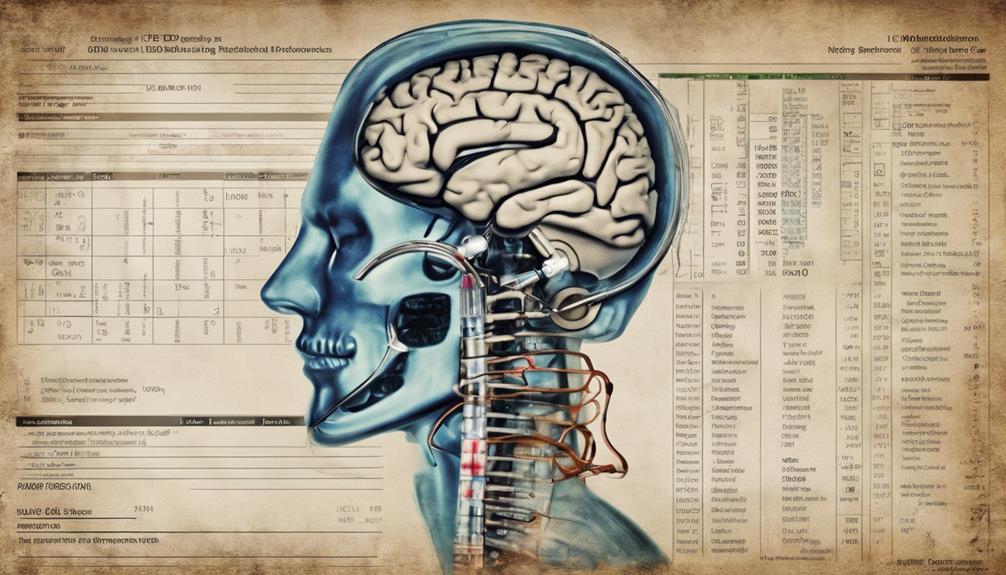When exploring the complex world of cognitive health, it is crucial to understand the differences between dementia and delirium. These subtle distinctions can greatly affect patients and their caregivers, influencing how care and treatment are approached.
As we explore the subtle yet critical variances in symptoms, causes, and management strategies, a deeper understanding emerges, shedding light on the complexities of cognitive impairment and the importance of accurate differentiation in clinical practice.
Overview of Dementia and Delirium Differences
When distinguishing between dementia and delirium, it's crucial to understand the key differences in their nature, onset, and impact on cognitive function. Delirium is an acute mental condition that affects attention and consciousness, often caused by acute illnesses or drug toxicity. In contrast, dementia is a chronic condition mainly impacting memory and cognitive function, typically due to structural brain changes. It's common to mistake delirium for dementia, especially in older adults. Delirium has a rapid onset and is reversible when the underlying cause is treated promptly, while dementia progresses slowly and is irreversible.
Diagnosis of delirium involves assessing changes in mental status, including attention and awareness, with a focus on identifying the underlying acute cause. In contrast, diagnosing dementia requires evaluating long-term memory loss and cognitive decline, often associated with anatomical changes in the brain. Understanding these differences is essential for providing accurate care to individuals experiencing these cognitive conditions.
Causes and Risk Factors Comparison

To understand the differences in causes and risk factors between delirium and dementia, it's essential to recognize the distinct pathways that lead to the development of these cognitive conditions. Delirium often arises from acute medical conditions or medication side effects, whereas dementia is primarily attributed to neurodegenerative processes or vascular insults to the brain.
Risk factors for delirium include older age, hospitalization, multiple medical conditions, and certain medications. In contrast, dementia risk factors involve genetic predisposition, age-related brain changes, and previous brain injuries.
Delirium can be reversible if the underlying cause is promptly identified and treated, while dementia is typically irreversible and progresses over time. Delirium presents with a sudden onset and fluctuating symptoms, while dementia has a slow and progressive onset with stable symptoms.
Given the overlap in risk factors and the potential for individuals with dementia to develop delirium, it's crucial to differentiate between the two conditions for appropriate management strategies and to prevent delirium in this vulnerable population.
Symptoms Variations Between Dementia and Delirium
Symptoms of dementia and delirium exhibit distinct characteristics, each with unique presentations indicative of their respective cognitive conditions. Dementia commonly shows forgetfulness, impaired memory, and judgment, while delirium often manifests as confusion, disorientation, and inattentiveness. Variable degrees of paranoia are more characteristic of dementia, whereas clouded sensorium and impaired short-term memory are typical of delirium.
Delirium typically has an acute onset and fluctuating course, affecting older individuals, while dementia presents with an insidious onset, chronic progression, and is predominantly seen in the elderly. Hallucinations and impaired judgment are symptoms more commonly associated with delirium, while variable alertness and poor judgment in advanced stages are indicative of dementia.
Delirium can be caused by a wide variety of ailments, substance abuse, or medications, while dementia is often linked to somatic or traumatic ailments and a predisposition to delirium. Understanding these differences in symptoms is crucial for accurate diagnosis and appropriate management in elderly patients.
Diagnostic Approaches for Distinguishing Dementia Vs. Delirium

Distinguishing between dementia and delirium relies on utilizing specific diagnostic tools and criteria to accurately differentiate the two cognitive conditions. When evaluating patients, it is crucial to consider the presence of older age, underlying medical conditions, and the sudden onset of symptoms as indicative of delirium, while dementia typically progresses gradually over time. The 4AT test is a valuable tool in the diagnostic process, prioritizing urgent management for delirium due to its reversible nature compared to dementia. In cases where both delirium and dementia coexist, clinicians must carefully assess for mixed symptoms to ensure an accurate diagnosis. The table below highlights key factors in the diagnosis of delirium and dementia:
| Diagnostic Approach | Delirium | Dementia |
|---|---|---|
| Onset of Symptoms | Sudden and fluctuating | Gradual progression |
| Diagnostic Tool | 4AT test | Clinical evaluation |
| Urgency of Management | Immediate | Gradual intervention |
Treatment Strategies and Management Considerations
Nonpharmacologic approaches represent the primary treatment modality for delirium, with pharmacological interventions reserved for instances of hyperactive presentation. When managing delirium and dementia, consider the following treatment strategies and management considerations:
- Identify and Address Underlying Causes: Investigating and managing the root causes of delirium can lead to its reversibility and improved outcomes.
- Regular Cognitive Assessments: Conducting routine cognitive assessments is crucial for early detection and intervention in both delirium and dementia cases.
- Utilize Interprofessional Team: Involving a diverse healthcare team comprising various professionals such as physicians, nurses, and therapists is essential for comprehensive care in managing delirium and dementia.
- Pharmacotherapy Options: While nonpharmacologic approaches are preferred for delirium, pharmacotherapy options like cholinesterase inhibitors and memantine can be considered for managing Alzheimer's disease.
Frequently Asked Questions
When Does Delirium Become Dementia?
When delirium transitions into dementia can vary among individuals.
The shift from delirium to dementia typically occurs when cognitive deficits persist beyond the acute phase of delirium, indicating a more chronic and progressive cognitive impairment.
Understanding this progression is crucial for timely intervention and appropriate care planning.
Monitoring for persistent cognitive symptoms post-delirium episode is essential to identify potential development of dementia and provide necessary support.
What Are the Three Types of Delirium?
Sure thing!
The three types of delirium are hyperactive, hypoactive, and mixed. Hyperactive delirium involves agitation and hallucinations, while hypoactive delirium shows as lethargy and withdrawn behavior. Mixed delirium combines features of both. Identifying the type is crucial for treatment.
How can we effectively manage these distinct presentations to ensure the best outcome for our patients?
What Are the 3 D's of Dementia?
When considering dementia, it's crucial to understand the 3 D's: Decline, Difficulty, and Disorientation.
Decline signifies the gradual loss of memory and cognitive abilities, while Difficulty involves challenges with daily tasks.
Disorientation results in confusion about time, place, and recognizing loved ones.
These hallmark symptoms help differentiate dementia from other cognitive conditions. Understanding these 3 D's is essential for recognizing and addressing the complexities of dementia care.
How Does a Person With Delirium Act?
When facing delirium, we might notice erratic behavior, like confusion, disorientation, and incoherent speech. Mood swings, hallucinations, and delusions could also occur. Tasks may become challenging, and focus might waver.
The three types—hyperactive, hypoactive, mixed—vary in alertness and activity levels. Symptoms can fluctuate, especially worsening in unfamiliar settings.
These manifestations of delirium can paint a complex picture of distress in affected individuals.
Conclusion
In conclusion, understanding the key differences between dementia and delirium is essential for accurate diagnosis and effective management. Despite their similarities in cognitive impairment, dementia is a chronic, irreversible condition, while delirium is typically acute and reversible.
Anticipated objection: Some may argue that the distinctions between the two conditions are subtle, but recognizing these nuances is crucial for providing appropriate care and support to individuals experiencing cognitive changes.









